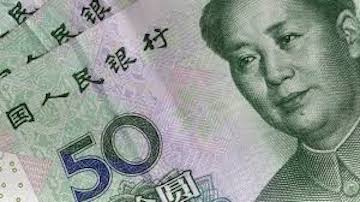The Trump administration formally labeled China a currency manipulator, further escalating its trade war with Beijing after the country’s central bank allowed the yuan to fall in retaliation for new U.S. tariffs.

While the U.S. Treasury Department’s determination is largely symbolic, as the potential punishments are a shadow of the steps Trump has already taken against China, it underscores the rapidly deteriorating relationship between the world’s two largest economies. The move immediately roiled markets, with S&P 500 Index futures sliding more than 1% Tuesday in Asia. The yuan slid further in offshore trading.
Under the designation, Treasury Secretary Steven Mnuchin “will engage with the International Monetary Fund to eliminate the unfair competitive advantage created by China’s latest actions,” the department said in a statement Monday.
Trump called the yuan’s plunge below the symbolically important level of 7 per dollar “currency manipulation” in a tweet earlier on Monday. And he indicated he’d like the Federal Reserve to counter the move.
The two countries escalated their trade war after Mnuchin and U.S. Trade Representative Robert Lighthizer returned from meetings with counterparts in Shanghai last week without progress toward a deal to resolve American complaints about China’s economic practices. Trump ordered 10% tariffs on about $300 billion in Chinese imports to begin Sept. 1, barring a breakthrough in negotiations.
Tit for Tat
China retaliated earlier on Monday, allowing the yuan to fall and announcing it would cease purchases of U.S. farm goods.
“This is another escalation of the trade war that’s very unhelpful, and will probably cause mayhem in the markets,” Richard Franulovich, a Westpac currency strategist, said in a phone interview. “If the intent is to restore calm to the markets, this is very counterproductive.”
The country’s designation as a currency manipulator comes with no immediate penalties. The Treasury typically makes the determinations in semiannual reports to Congress, but Monday’s action came outside that process; the next report is expected in October.
Officially, the designation requires the U.S. government to seek negotiations with the government accused of manipulation. But officials in Beijing and Washington have already been engaged in trade talks for more than a year. If there is no progress a year after the designation, China could face possible sanctions including its firms being prohibited from competition for U.S. government contracts.
Leaders Gathering
China watchers say the U.S. move would make compromise more difficult for the Chinese side. It comes just as President Xi Jinping is expected to enter an informal annual Communist Party leadership conference in the seaside resort of Beidaihe.
“The timing couldn’t be worse,” said Bonnie Glaser, director of the China Power Project at the Center for Strategic and International Studies in Washington. “The potential for compromise has past. Both sides are digging in and both leaders are first and foremost concerned about their domestic audiences. Politics is in the lead.”
The Treasury’s announcement heightens focus on China’s morning fixing for the yuan in onshore trading Tuesday, one of the methods by which traders see it sending signals on the exchange rate. Offshore, the yuan was down 0.5% at 7.1373 per dollar as of 8:37 a.m. in Tokyo. The yen gained on haven demand.
Getting Worse
“Our sense is that trade tensions are going to get worse before they get better and now you could argue that we are officially in currency war too,” said Rodrigo Catril, senior foreign-exchange strategist at National Australia Bank Ltd.
If the animosity between Washington and Beijing continues, U.S. stocks could slide another 8%, said Hari Hariharan, chief executive officer of New York-based NWI Management.
“Everything will get clobbered,” Hariharan said. “The more the U.S. does, the more upset the Chinese get.”
“We will see more of what we’ve seen already Monday: more weakness in equities, a bigger fall in yields, and a rush to safe havens,” Franulovich said.
While Trump promised to declare China a currency manipulator during his presidential campaign in 2016, Treasury had so far declined to take the step. The country hasn’t officially been labeled a manipulator since 1998.
Criteria Question
Eswar Prasad, an economist at Cornell University who worked in the International Monetary Fund’s China division, said China still doesn’t meet Treasury’s criteria for manipulation. Countries are measured for manipulation based on their trade deficits with the U.S., their histories of intervention and their current-account balances.
“Treasury has made what seems like an arbitrary determination of currency manipulation since China hardly meets all of the relevant criteria and despite the dilution of those criteria over time,” he said.
Mark Sobel, who was a civil servant in Treasury’s international affairs unit for 40 years, said that China’s current account is near balance.
“It has not been intervening,” he said. “By Treasury’s own FX-report criteria, China doesn’t even come close to meeting the terms for manipulation.”
Mnuchin said in June that China was intervening in currency markets to prop up the yuan, and warned it could be designated a manipulator if it stopped. “It’s not coincidental in my mind that the currency has moved from approximately 6.30 to 6.90” to the dollar, he said June 8 after a Group of 20 meeting in Fukuoka, Japan.










